Life with Braces
Now that you have your braces, how do you take care of them? It’s important for you to know how to properly take care of your braces throughout your entire orthodontic treatment.
Brushing your teeth with braces
Proper brushing and flossing will keep your teeth and gums healthy, and keep your breath smelling fresh. Don’t forget to keep regular appointments with your family dentist. Unless we have said otherwise, we’d like you to have a checkup and cleaning every six months.
Brushing:
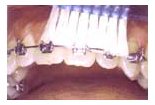
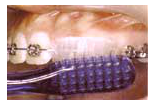
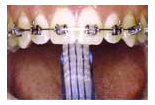
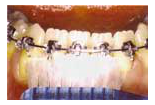
1. Use a dry brush with a small amount of toothpaste. Place bristles where gums and teeth meet.
2. Use circular, vibrating motions around the gum lines, 10 seconds on each tooth.
3. Brush slowly, each arch separately, every tooth.
4. Brush the lower teeth up and the upper teeth down. Brush your tongue and the roof of your mouth too!
Flossing:
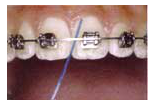
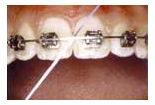
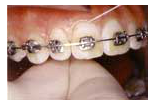
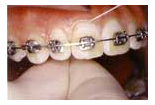
5. Carefully pull unwaxed floss between wire and braces. A floss threader may be helpful.
6. Floss carefully around the braces.
7. Floss carefully around the gum area.
8. Floss carefully around each tooth.
Eating with braces
Don’t worry; you’ll be eating popcorn and snacking on potato chips again in no time! However, before you can start enjoying some of the treats you love, you will need to take special care to avoid any foods that could damage your new appliances.
Foods to avoid with braces:
Foods you CAN eat with braces:
Soreness caused from braces and appliances
When you first get your braces, you may notice that your teeth and mouth feel a little tender or sore. This is perfectly normal for patients who have just gotten their braces put on, and we promise your mouth will not be sore forever! The discomfort is typically worst 1 day after your adjustments. At 2-3 days, you should begin to feel much more comfortable and by 1 week’s time, you feel perfectly normal.
If the pain is more severe, you can also try taking a pain reliever. Over the counter medications such as ibuprophen or Tylenol will usually be adequate to control the discomfort. It is also not uncommon for your lips, cheeks, and tongue to become irritated for one to two weeks as they toughen and become used to the braces. We would be happy to give you some wax that you can put over the braces to lessen the tenderness. If you need some wax, please let us know!
Loose teeth
If your teeth begin feeling a little loose, don’t worry; this is normal! Your braces must first loosen your teeth in order to move them into the right position. Once your teeth have been repositioned, they will no longer be loose.
Loose wires and bands
The wires and bands on your braces may come loose. If this happens, please contact us as soon as possible so that we can check and repair your appliance. If any piece of your appliance comes off, be sure to save it and bring it to the office with you.
You can temporarily fix the loose wire by using the back of a spoon, the eraser end of a pencil, or a pair of tweezers to carefully and gently push the wire back into place. If the loose wire is causing irritation to your lips or cheeks, put wax or a wet cotton ball over the broken wire to relieve the discomfort.
Take care of your appliances
Damaged appliances can increase the length of your treatment process, so be sure to take care of all your appliances. Your teeth and jaws can only move into their correct positions if you consistently wear the rubber bands, headgear, retainer, or other appliances prescribed by your doctor.
Playing sports with braces
Game, Set, Match – we have great news for athletes! You can still play sports even while undergoing orthodontic treatment! If you do play sports, it’s recommended that you wear a mouthguard in order to protect your teeth and your appliance. Let your doctor know if you need help finding the right mouthguard for the best protection.
In case of a sports emergency, be sure to immediately check your mouth and your appliance for any damage that may have occurred. If you notice any loose teeth, or if your appliance has been damaged, please contact our office right away. You can temporarily relieve the discomfort with wax or by rinsing your mouth with warm saltwater.
Mouthguards
Sports related injuries to the mouth and jaws are some of the most common injuries received by athletes. Protecting your smile while playing sports is essential when you have braces. Mouthguards help protect your teeth and gums from injury. If you participate in high-contact sports the American Association of Orthodontists recommends you wear a mouthguard. Be sure to ask your doctor about mouthguards at your next appointment.
